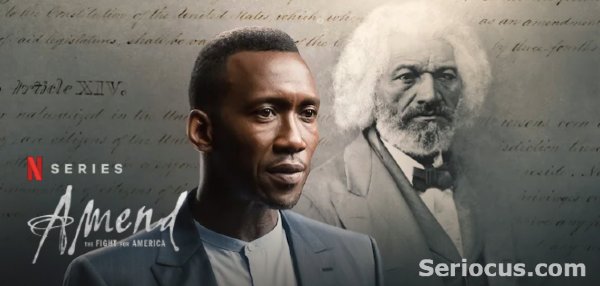In sections, “Amend: The Fight for America” is goofy, while in others, it is serious. However, a personable Will Smith, a few little-known facts, and an especially inspiring episode give this docuseries about the importance of the 14th Amendment a reason to exist.

Amend Review
What is the 14th Amendment, and what does it mean? If it took you longer than five seconds to respond, there’s a series you should watch.
“Amend – The Fight for America” is a six-part docuseries hosted by Will Smith, directed by Kenny Leon (“American Son”) and Reinaldo Marcus Green (“Monsters and Men”), and produced by Robe Imbriano and Tom Yellin.
The series explores the significance of the 14th Amendment, which establishes citizens’ rights to “equal protection of the law,” and how it has influenced everything from black people’s voting rights to abortion to homosexual marriage. The series revisits historic court judgements that have been challenged over its six episodes.
Also read: Sweet tooth review | Latest adventure web series
In sections, “Amend: The Fight for America” is goofy, while in others, it is serious. However, a personable Will Smith, a few little-known facts, and an especially inspiring episode give this docuseries about the importance of the 14th Amendment a reason to exist.
“Amend” takes a three-pronged strategy to guiding us through the 14th Amendment’s timeline. The first is a panel of experts, including Equal Justice Initiative founder Bryan Stevenson and the show’s executive producer Larry Wilmore, who discuss the current ramifications of landmark cases such as Dred Scott v.
Board of Education and Brown v. Board of Education. Celebrities such as Daveed Diggs, Pedro Pascal, Aja Naomi King, and others use celebrity monologues to deliver the words penned by renowned and lesser-known persons surrounding these seismic events. For example, Mahershala Ali plays Frederick Douglass.
Though animation is utilised to illustrate horrible pre-World War II events such as the Colfax Massacre, the producers avoid using it when performing the readings to avoid the temptation of donning wigs and makeup on the actors. Ali wears a smart blazer and is surrounded by photographs of Douglass on the minimalist set while he speaks directly to the camera.
Also read: Hostel Daze Season 2 Review | Latest comedy web series
Beyond individuals with a basic understanding of the 14th Amendment, it’s unclear who this series is aimed at. Is it a group of like-minded people who are already fighting for civil liberties? Or those on the opposite side of the aisle who look the other way when it comes to institutional inequities? Given that the first episode ends with a cry for reconciliation, the series may wish to make amends for the decent individuals on both sides.
The erratic programme is at its most enthralling when it unearths significant historical people who have been forgotten. The third episode, “Wait,” is on LGBT leader Bayard Rustin and is centred on civil rights.
The fourth, “Control,” features Pauli Murray, a women’s rights activist who speaks out against misogyny. The sixth book, “Promise,” looks at the struggle of Chinese-American Wong Kim Ark to attain citizenship in 1897.
Smith, a blockbuster actor with a strong middle-American appeal who is also set to play in Marcus Green’s upcoming biopic “King Richard,” is the ideal host for the engrossing docuseries.
Also read: Sooryavanshi Review
He deploys rhetorical methods to illustrate to audiences the harm racism causes, relying on an extremely sincere, on-the-nose demeanour. He explains why urging black people to wait for equal rights is counterproductive to systemic change in “Wait.”
Smith’s natural charm and inoffensive wit—tools that made him a bankable star—allow him to convey the message of the docuseries to audiences as if they were third graders. That isn’t a criticism of Smith. He may be the only person capable of infusing this full-hearted programme with enough enthusiasm to make it feel less like eating your peas while watching it.
“Love,” which focuses on LGBTQ+ issues, is by far the strongest episode of “Amend.” Because the primary triumphs in the gay rights movement occurred lately, the episode relies on interviews with key contemporary personalities rather than actors presenting pull quotations of renowned figures (one exception being a poignant yet resolute Laverne Cox speaking the words of James Baldwin).
When Johns Hopkins History professor Martha Jones, herself the product of an interracial marriage, explains the significance of Loving v. Virginia to her family, we see a topic virtually brought to tears for the first time. Al Gerhardstein, who represented the plaintiffs in Obergefell v.
Hodges before the Supreme Court, walks us through the various court cases that set the stage for the Supreme Court’s historic legalisation of homosexual marriage. Jim Obergefell, on the other hand, gives the program’s most heartfelt moments, as he recalls his husband’s battle with ALS and how the two of them campaigned to have their marriage recognised in Ohio.
The staid series tries to repeat those moments with Jones and Obergefell in future episodes, and even in the sixth episode, which is about Black Lives Matter and DACA, the events hit significant intellectual themes but barely skim the emotional core. Instead, it’s the tales in “Love,” as well as the showrunners’ ability to recreate the warmth of the country’s recent history, that make the show’s long trip worthwhile.